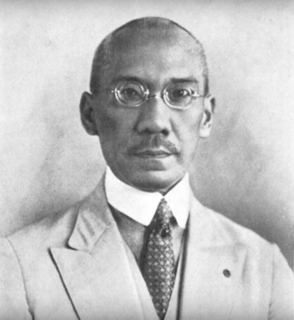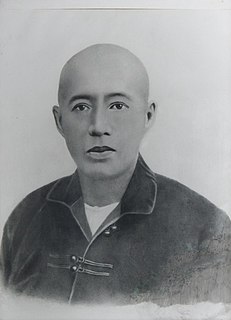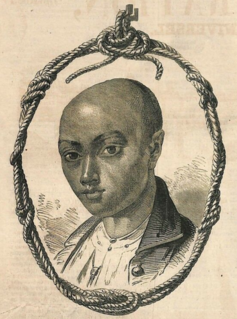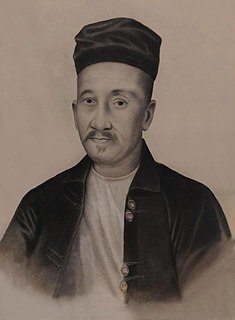 W
WSia was a hereditary title of Chinese origin, used mostly in colonial Indonesia. It was borne by the descendants of Chinese officers, who were high-ranking, Chinese civil bureaucrats in the Dutch colonial government, bearing the ranks of Majoor, Kapitein or Luitenant der Chinezen.
 W
WHan Oen Lee, Luitenant der Chinezen (1856—1893) was a Chinese-Indonesian magnate, who governed the Chinese community of Bekasi as its Luitenant der Chinezen, an important administrative post in the Dutch colonial bureaucracy. He was also the Landheer (landlord) of the particuliere land of Gaboes. Today, he is best known as the father of the late colonial statesman Hok Hoei Kan (1881—1951).
 W
WKan Hok Hoei Sia, generally known as Hok Hoei Kan or in short H. H. Kan, was a prominent public figure, statesman and patrician landowner of Peranakan Chinese descent in the Dutch East Indies.
 W
WKhouw Kim An, 5th Majoor der Chinezen was a high-ranking Chinese Indonesian bureaucrat, public figure and landlord who served as the fifth and last Majoor der Chinezen of Batavia, Dutch East Indies. The Chinese Mayoralty was the highest-ranking, Chinese government position in the East Indies with considerable political and judicial jurisdiction over the colony's Chinese subjects. The Batavian Mayoralty was one of the oldest public institutions in the Dutch colonial empire, perhaps second only in antiquity to the viceregal post of Governor-General of the Dutch East Indies.
 W
WKhouw Yauw Kie, Kapitein der Chinezen, also spelled Khouw Jaouw Kie, Yaouw Kee, was a high-ranking Chinese-Indonesian bureaucrat. He was the first scion of the influential Khouw family of Tamboen to serve on the Chinese Council of Batavia.
 W
WKwee Thiam Tjing Sia, also known by his pen name Tjamboek Bērdoeri ['Thorn Whip'], was a prominent Indonesian writer, journalist and left-wing political activist. He is best remembered for his 1947 book, 'Indonesia dalem Api dan Bara', and for his role as a co-founder of the Partai Tionghoa Indonesia [the 'Chinese-Indonesian Party'] in 1932.
 W
WLie Tjoe Hong, 3rd Majoor der Chinezen was a Chinese-Indonesian bureaucrat who served as the third Majoor der Chinezen, or Chinese headman, of Batavia, now Jakarta, capital of Indonesia. This was the most senior Chinese position in the colonial civil bureaucracy of the Dutch East Indies. As Majoor, Lie was also the Chairman of the Chinese Council of Batavia, the city's highest Chinese government body.
 W
WOey Djie San, Kapitein der Chinezen was a Chinese-Indonesian public figure, bureaucrat and landlord, best known for his role as Landheer of Karawatji and Kapitein der Chinezen of Tangerang. In the latter capacity, he headed the local Chinese civil administration in Tangerang as part of the Dutch colonial system of 'indirect rule'.
 W
WOey Giok Koen, Kapitein der Chinezen was a Chinese-Indonesian public figure, bureaucrat and Landheer, best known for his role as Kapitein der Chinezen of Tangerang and Meester Cornelis, and as one of the richest landowners in the Dutch East Indies. As Kapitein, he headed the local Chinese civil administration in Tangerang and Meester Cornelis as part of the Dutch colonial system of 'indirect rule'. In 1893, he bought the particuliere landen or private domains of Tigaraksa and Pondok Kosambi.
 W
WOey Tamba Sia, also spelt Oeij Tambah Sia, or often mistakenly Oey Tambahsia, was a rich, Chinese-Indonesian playboy hanged by the Dutch colonial government due to his involvement in a number of murder cases in Batavia, now Jakarta, capital of colonial Indonesia. His life has become part of Jakarta folklore, and inspired numerous literary works.
 W
WPhoa Keng Hek Sia was a Chinese Indonesian Landheer (landlord), social activist and founding president of Tiong Hoa Hwe Koan, an influential Confucian educational and social organisation meant to better the position of ethnic Chinese in the Dutch East Indies. He was also one of the founders of Institut Teknologi Bandung.
 W
WTan Eng Goan, 1st Majoor der Chinezen was a high-ranking bureaucrat who served as the first Majoor der Chinezen of Batavia, capital of colonial Indonesia. This was the highest-ranking Chinese position in the civil administration of the Dutch East Indies.